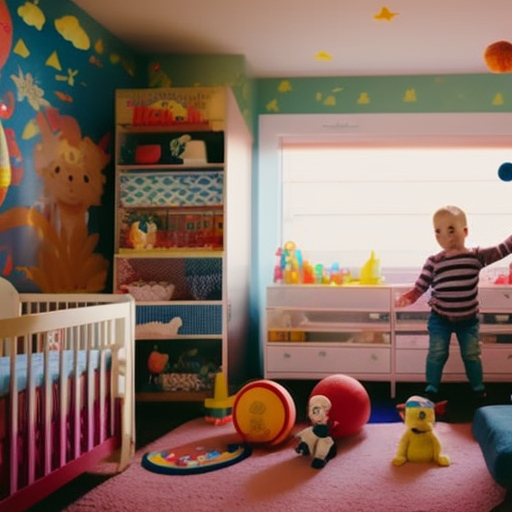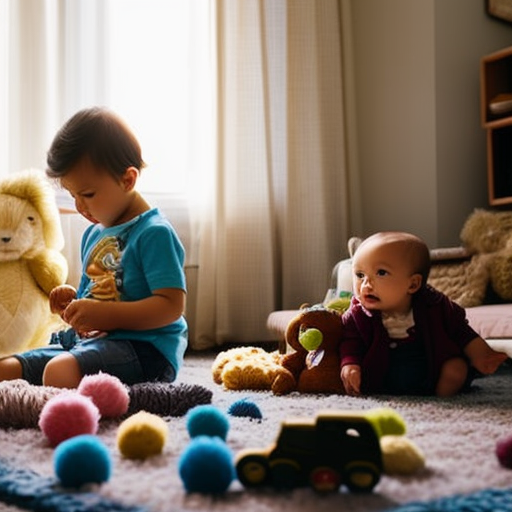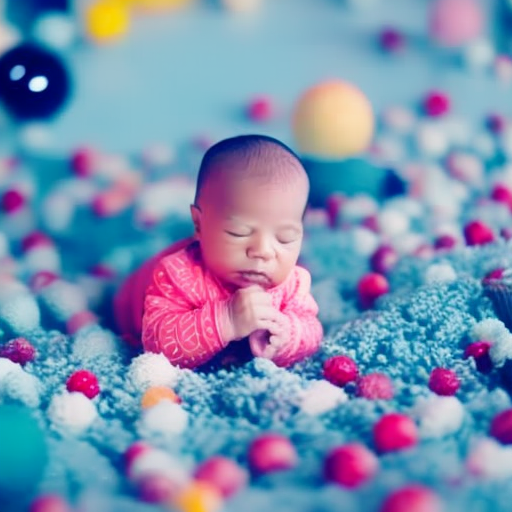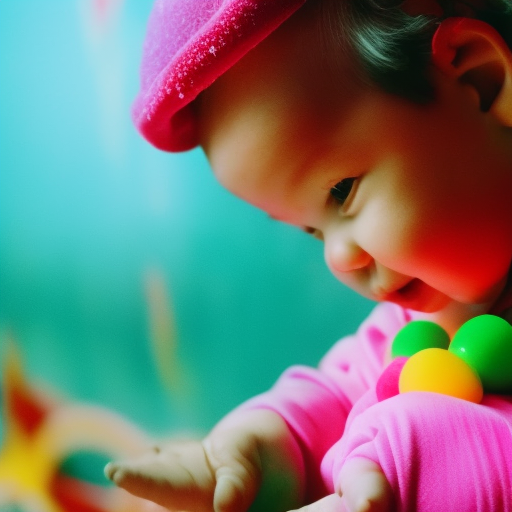"Cherishing Little Steps - A Haven for Baby and Family Journeys"
Encouraging Creativity in Infants
Did you know that creativity is not only limited to adults, but can also be nurtured and encouraged in infants?
As a parent or caregiver, you play a crucial role in fostering your baby’s creative development from an early age. By creating a nurturing environment and providing open-ended play materials, you can unlock your little one’s imagination and help them explore the world around them.
But that’s just the beginning. There are various ways to stimulate your baby’s creativity, and in this discussion, we will explore some effective strategies that will not only engage their senses but also support their self-expression and curiosity.
So, let’s embark on this journey of discovering how to encourage creativity in infants together.
Key Takeaways
- Creativity is crucial for infants’ cognitive development and overall well-being.
- Providing a nurturing environment that encourages exploration and self-expression is important.
- Open-ended play materials promote cognitive development, creativity, and problem-solving skills.
- Engaging in imaginative play, sensory exploration, and exposure to books and art stimulate curiosity and creativity.
The Importance of Fostering Creativity

Fostering creativity in infants is crucial for their cognitive development and overall well-being. Research has shown that promoting cognitive development through creative activities has numerous benefits for infants. Engaging in creative activities, such as drawing, painting, and playing with building blocks, stimulates their brain and enhances their problem-solving skills.
Creativity allows infants to explore their surroundings and learn about the world in a hands-on manner. When they engage in creative activities, they’re encouraged to think critically, make decisions, and find solutions to problems. Through these experiences, they develop important cognitive skills, such as memory, attention, and spatial awareness.
Moreover, creative expression provides infants with an outlet to communicate and express themselves. They may not have developed verbal communication skills yet, but through drawing, painting, and other forms of creative expression, they can convey their thoughts and emotions. This helps them develop a sense of self and build confidence in their abilities.
Creating a Nurturing Environment

To cultivate a nurturing environment that promotes creativity in infants, it’s essential to provide them with a supportive and stimulating atmosphere that encourages exploration and self-expression. Creating a safe space for your little one is crucial. Make sure their environment is free from hazards and distractions. Use soft lighting, soothing colors, and comfortable furnishings to create a calming atmosphere. Arrange their toys and materials in an organized manner, making it easy for them to access and explore.
Encouraging self-discovery is another key aspect of fostering creativity. Allow your infant to freely explore their surroundings, providing them with age-appropriate toys and objects that encourage sensory exploration. Offer them a variety of materials such as playdough, crayons, and blocks to engage their senses and spark their curiosity.
Interact with your infant by talking, singing, and reading to them. Engaging in these activities not only fosters language development but also encourages their imagination and creativity. Respond positively to their attempts at self-expression and offer praise and encouragement along the way.
Providing Open-Ended Play Materials

Open-ended play materials provide infants with the freedom to explore, create, and imagine without limitations or predefined outcomes. These materials, such as natural materials and role playing toys, are essential for fostering creativity in infants.
Natural materials, such as wooden blocks, seashells, or pinecones, offer a sensory experience that engages multiple senses and encourages imaginative play. They allow infants to manipulate and transform objects, helping them develop fine motor skills and problem-solving abilities.
Role playing toys, such as dolls, stuffed animals, or toy kitchens, enable infants to engage in pretend play and develop their social and emotional skills. Through role playing, infants can imitate real-life situations, express their thoughts and feelings, and develop their language skills. These toys also provide an opportunity for infants to practice social interactions, empathy, and cooperation.
Research has shown that open-ended play materials promote cognitive development, creativity, and problem-solving skills in infants. By providing infants with a variety of open-ended play materials, parents and caregivers can support their natural curiosity and encourage them to explore and experiment in a safe and stimulating environment.
Encouraging Sensory Exploration

As you continue to nurture your infant’s creativity, another important aspect to focus on is encouraging sensory exploration. Sensory stimulation plays a crucial role in your baby’s cognitive development and overall well-being. By providing opportunities for hands-on exploration, you can help your little one develop their senses and foster their creativity in a meaningful way.
Here are four ways you can encourage sensory exploration in your infant:
-
Create a sensory-rich environment: Surround your baby with a variety of textures, colors, and sounds. Use soft blankets, textured toys, and musical mobiles to engage their senses and pique their curiosity.
-
Offer safe and age-appropriate materials: Provide your infant with safe objects they can touch, squeeze, and explore. Choose toys with different shapes, sizes, and textures that encourage them to use their hands and fingers.
-
Engage in sensory play activities: Set up sensory play stations where your baby can explore materials like water, sand, or playdough. Let them experiment with different textures and temperatures, allowing their senses to come alive.
-
Encourage movement and physical play: Physical activities such as tummy time, crawling, and reaching for objects help your baby develop their senses further. Encourage them to move around and explore their surroundings, as this stimulates their senses and fosters their creativity.
Engaging in Imaginative Play Together

How can you engage in imaginative play with your infant to foster their creativity? Pretend play and role-playing activities are excellent ways to encourage your little one’s imagination and creativity. By engaging in these activities together, you can create a nurturing environment that supports their cognitive, emotional, and social development.
Pretend play involves using the imagination to create different scenarios and act them out. You can start by providing your infant with simple props, such as stuffed animals or toy cars, and encourage them to interact with these objects in imaginative ways. For example, you can pretend to have a tea party with your little one, using toy cups and saucers, or you can pretend to be animals and make animal sounds together.
Role-playing activities involve taking on different roles and acting them out. This can include playing dress-up, where you and your infant can wear different costumes and pretend to be different characters. You can also engage in dramatic play, such as pretending to be a doctor and a patient, or a chef and a customer.
Engaging in imaginative play with your infant not only fosters their creativity but also helps develop their problem-solving skills, language abilities, and social interactions. It allows them to explore different roles, emotions, and perspectives, enhancing their understanding of the world around them.
Stimulating Curiosity Through Books and Art

Encourage your infant’s curiosity and creativity by introducing them to a world of captivating books and artistic experiences. Stimulating curiosity through books and art not only promotes sensory development but also enhances their cognitive and emotional growth.
Here are four ways to engage your infant in the world of literature and art:
-
Read aloud: Choose age-appropriate books with vibrant illustrations and simple text. Reading aloud to your infant not only exposes them to new vocabulary but also helps develop their listening skills.
-
Incorporate music: Sing nursery rhymes, play soothing melodies, or introduce musical toys to your infant. Music stimulates their auditory senses and encourages movement, fostering a deeper connection to the world around them.
-
Explore textures: Introduce touch-and-feel books and sensory art activities that allow your infant to explore different textures. This helps develop their tactile senses and promotes fine motor skills.
-
Encourage creativity: Provide your infant with safe and age-appropriate art supplies like finger paints or chunky crayons. Let them freely explore and create, allowing their imagination to flourish.
Allowing for Independent Play and Self-Expression

Now that you have introduced your infant to the world of literature and art, it’s important to create a space that allows for independent play and self-expression. Independent exploration and self-discovery are crucial for your little one’s creativity to flourish. By providing an environment that encourages free play and self-expression, you are nurturing their imagination and fostering their ability to think outside the box.
One way to promote independent play is by setting up a designated play area in your home. This can be a corner of their bedroom or a section of the living room. Make sure the space is safe and filled with age-appropriate toys and materials that stimulate their senses. Allow your infant to freely explore and discover their surroundings without constant supervision.
In addition to a play area, consider incorporating an art corner where your child can freely express themselves through various art mediums. Provide them with crayons, finger paints, and paper, allowing them to create their own masterpieces. By giving them the opportunity to make choices and engage in self-expression, you are fostering their creativity and boosting their confidence.
Remember, independent play and self-expression are essential for your infant’s development. By creating a space that promotes these activities, you are setting the stage for their imagination to soar and their creativity to thrive. Embrace their independence and watch as they discover the world around them in their own unique way.
| Benefits of Independent Play and Self-Expression | How to Encourage Independent Play and Self-Expression |
|---|---|
| 1. Enhances creativity and imagination | 1. Set up a designated play area |
| 2. Boosts problem-solving skills | 2. Provide age-appropriate toys and materials |
| 3. Fosters independence and self-confidence | 3. Create an art corner for self-expression |
| 4. Develops decision-making abilities | 4. Allow freedom and minimal supervision |
| 5. Stimulates cognitive and emotional development | 5. Embrace and encourage their independence |
Celebrating and Supporting Your Baby’s Creativity

To celebrate and support your baby’s creativity, it’s important to provide them with opportunities for exploration and expression in a variety of ways. Supporting your baby’s artistic development and encouraging self-expression can help foster their creativity and imagination. Here are four ways you can celebrate and support your baby’s creativity:
-
Provide a variety of art materials: Offer your baby a range of art materials, such as finger paints, crayons, and safe clay, to explore and experiment with. This allows them to express their creativity through different mediums and textures.
-
Create a dedicated art space: Set up a designated area in your home where your baby can engage in art activities. This space can include a small table, art supplies, and a display area for showcasing their creations. Having their own art space encourages them to freely express themselves.
-
Encourage open-ended play: Engage your baby in activities that promote open-ended play, such as building blocks or pretend play. These activities allow them to use their imagination and creativity to explore different scenarios and problem-solving.
-
Display and celebrate their artwork: Proudly display your baby’s artwork around your home. This not only shows them that their creations are valued but also encourages them to continue exploring their artistic abilities.
Frequently Asked Questions
What Are Some Specific Open-Ended Play Materials That Can Help Foster Creativity in Infants?
You can encourage creativity in infants by providing open-ended toys that promote sensory exploration. These materials allow them to freely explore and use their imagination, fostering their creativity from a young age.
How Can Parents Engage in Imaginative Play With Their Infants?
To engage in imaginative play with your infant, use engaging toys that encourage sensory exploration. Play games like peek-a-boo or pretend play with stuffed animals. Let your creativity flow and have fun together!
What Are Some Strategies for Stimulating Curiosity Through Books and Art in Infants?
To stimulate curiosity in infants, engage them with age-appropriate books and art activities. Reading aloud with enthusiasm and pointing out colors and shapes can help develop their early learning skills while sparking their interest in the world around them.
How Can Parents Encourage Independent Play and Self-Expression in Their Infants?
You can encourage independent play and nurture self-expression in your infants by providing them with open-ended toys and materials, praising their efforts, and giving them the freedom to explore and create on their own terms.
How Can Parents Celebrate and Support Their Baby’s Creativity on a Daily Basis?
To celebrate and support your baby’s creativity on a daily basis, create a supportive environment by providing open-ended toys and art materials. Incorporate sensory experiences into daily routines through music, movement, and exploration.
Conclusion
So, there you have it! By fostering creativity in infants, you aren’t only providing them with a fun and stimulating environment, but you’re also laying the foundation for a lifetime of curiosity, imagination, and innovation.
Research has shown that encouraging creativity in the early years leads to enhanced problem-solving skills, improved cognitive development, and increased self-expression.
So, go ahead and create a nurturing space, provide open-ended play materials, engage in imaginative play, and celebrate your baby’s creative spirit. The possibilities are endless!



I wanted to draft you that little bit of word so as to say thanks as before with the magnificent suggestions you’ve featured on this website. It was so surprisingly generous with you to supply openly all many individuals might have offered for sale for an e-book to get some profit for their own end, particularly considering the fact that you might well have done it in the event you considered necessary. Those inspiring ideas additionally served to be a fantastic way to recognize that someone else have the identical zeal the same as my very own to know a great deal more with reference to this condition. Certainly there are a lot more pleasant occasions up front for folks who read your blog post.